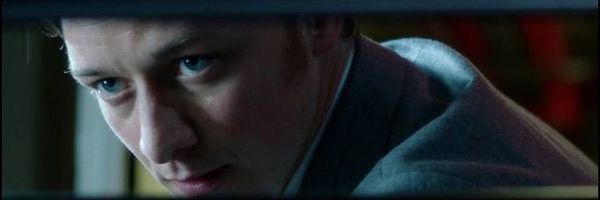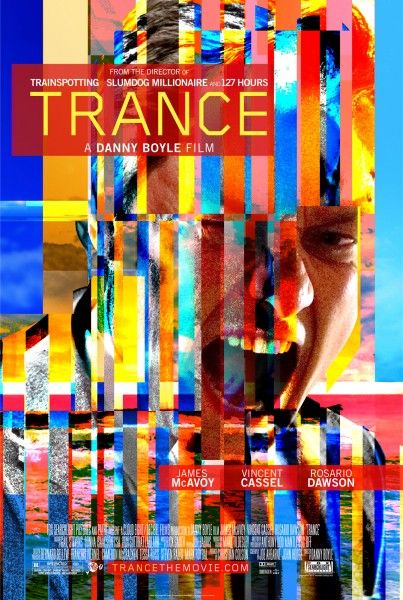To borrow the film's use of mixed metaphors, the thread of Trance tangles itself up in knots to the point where you don't care if you unlock it. What begins as a twisty thriller eventually gets lost in those twists, and frequent attempts to double-back eventually cut off the film's momentum as what should be an intriguing mystery becomes a tiresome parade of flat explanations and convoluted plot developments. Despite the stunning cinematography and director Danny Boyle's thoughtful symbolism and thematic ambition, Trance can't hold itself together due to the half-baked plot and the miscasting of Rosario Dawson as the woman who should keep us under her portentous spell.
Art auctioneer Simon (James McAvoy) has planned a heist with criminal Franck (Vincent Cassel) to steal a $27 million painting. But during the heist, Simon decides to taze Franck, leading Franck to retaliate by smacking Simon in the head with a shotgun. When Simon awakens, he has partial amnesia, and can't remember where he stashed the painting. Franck enlists Elizabeth (Dawson), a hypnotherapist, to retrieve the memories from Simon, but as she delves deeper, new revelations begin to emerge, and the line between reality and false memories begin to blur.
Boyle has plenty of room to play with his audience, but Joe Ahearne and John Hodge's script simply becomes too unwieldy to keep us captivated. The film wants to break boundaries, and plenty of movies have found a way to keep the audience fascinated by unreliable narrators and a deceptive structure. Trance keeps changing directions, but rather than create a wild ride, it swerves everywhere with no sense of how to get where it's going.
Somewhere in between its attempts to find a cohesive plot, Boyle finds ways to bring his story to interesting places. He thoughtfully explores the level of vulnerability that comes with allowing someone to enter your thoughts, change them, and readjust perception. Trance is in the right headspace for where it wants to be, and Boyle always manages to create nice visual touches like using an empty frame to illustrate Simon's lost thoughts, and reflective surfaces to show the duplicity of the various characters. Anthony Dod Mantle's cinematography is absolutely stunning, and it manages to keep the picture feeling electric even when the story begins losing its energy around the halfway mark.
The movie is further drained by the weak performance from Dawson. Although the memories may be locked in Simon's head, the film eventually shifts the focus to Elizabeth, and Dawson simply doesn't have the presence or the range to hold us captive, which is a necessary trait when playing a character whose profession is to control people. Dawson may be seductive, but she's never dangerous. Elizabeth exists in a fragile place between vulnerability and holding complete power over a person's mind. She should engender our sympathy and our fear, but we feel neither. Instead, she's reduced to an exposition machine who has to walk us through what's happening to Simon, and her emotional arc gets lost in the convoluted structure.
The characters in Trance are caught between submission and control. Simon is physically controlled by Franck, and forced to be mentally controlled by Elizabeth, so Simon's only remaining control over the situation is his knowledge of the painting's location. A complex but rewarding web runs through the first half, but Boyle's attempt to create a controlled chaos of shifting perception and reality leads the film into a cage where we always had a sense of what was trapped even if the figure was somewhat obscured. Sadly, fascinating notions of free will, predestination, identity, and memory all become lost in a hallucinatory haze.
Rating: C


